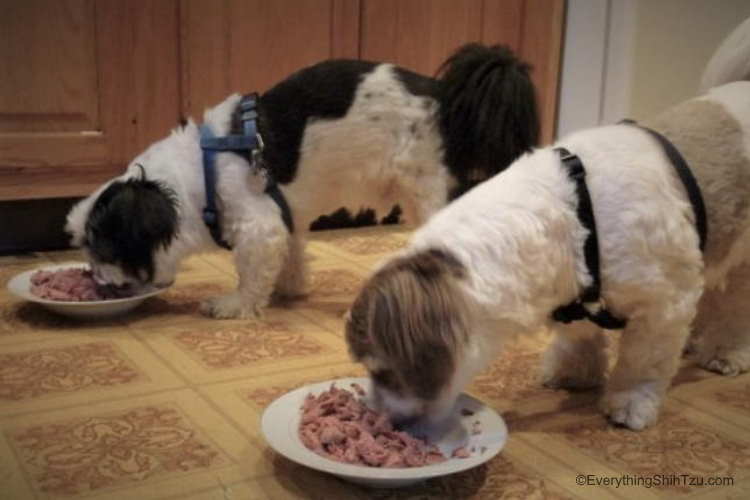- Home
- Shih Tzu diet
- compare organic, holistic, all-natural
Organic vs, Holistic vs. All Natural Dog Foods: What Does It All Mean For Your Dog
By Everything Shih Tzu August 22, 2022
This post may contain affiliate links. Read privacy & disclosure policy for info
Organic? Holistic? All-natural? Dog owners have a lot of different kinds of dog foods to choose from, which isn't necessarily a bad thing.
But there is so much marketing lingo for dog food that it can be hard for some pet owners to keep up.

As dog owners, we care about their health and want to feed them the best food we can find.
But, even the most patient person might throw their hands up in defeat if they don't know the differences between regular dog food and organic, all-natural, and holistic dog food.
When a bag of dog food states it is "organic," "holistic," or "all-natural," it implies that it is good for your dog's health and that the ingredients are made according to certain rules. But although it may all be healthy, there are a few big differences between the three.
Although you might be wondering how organic, holistic, and all-natural dog food labels stack up against one another, the first thing you need to do is to get a clear understanding on the meanings of each of these three types.
Keep reading for a quick introduction to organic, holistic, and natural dog foods.
What is Organic Dog Food?
The term "organic" describes the production process rather than the product's quality.
When you see the word organic on a bag of dog food, it means that none of the ingredients used to make it were exposed to ionizing radiation, pesticides, synthetic fertilizers, sewage sludge, or genetically modified organisms (GMOs) in any way during the manufacturing process.
Also, animals used to produce meat, poultry, eggs, or dairy products cannot be given antibiotics or growth hormones, and they must be given access to the great outdoors.
What is holistic dog food?
The whole point of a holistic diet is to eat nutritional food in its most natural state.
Holistic nutrition is based on whole foods that have been processed as little as possible, are organic, and come from local farms.
It's a way of eating where you keep a close eye on what you put in your body and focus on eating for health above all else.
When it comes to pet food, however, the term holistic is debatable in the pet food community.
Because there is no oversight in using the words "holistic dog food," any dog food company can use it on their labels regardless of the ingredients used to make the food.
As a result, labeling dog food as holistic may not mean very much.
What is All-Natural Dog Food?
When you see the words "natural dog food" on the label of a product, this indicates that all of the ingredients, or at least a portion of them, are natural and that the product does not contain any artificial additives or preservatives.
On the other hand, if the dog food labels claim that it is "all-natural" or "100% natural," this means that each ingredient in the dog food is made using only natural elements.
The words "all-natural" or "100% natural" may only be used to describe a product when each and every ingredient that went into the making of the product complies with the AAFCO definition of the term.
If an ingredient has been manufactured by a chemical process, then it cannot be deemed natural.
The Difference Between Organic, Holistic, and All-Natural Dog Food
Now that you have a basic understanding of holistic, all-natural, and organic dog food, let's discuss how these three types of food compare and their key distinctions.
1. Holistic dog food is not regulated.
Holistic dog food is the only one of the three that does not have any criteria governing what may be classified as holistic dog food.
According to PetMD, there is no legal definition of holistic dog food under United States Department of Agriculture (USDA) rules or AAFCO, often known as the Association of American Feed Control.
As a result, there is no regulation for holistic food because, technically, it is not a term but rather something that pet food companies market to dog owners.
Labels on dog food such as "organic" and "all-natural" are required to adhere to USDA regulations; however, the meanings and requirements for each of these terms might vary slightly.
Because the USDA does not have official rules for pet food, pet food that markets itself as organic or all-natural must follow the guidelines for human food.
2. Organic food must also meet the standards of the National Organic Program (NOP)
According to the definition provided by the AAFCO, organic pet food must be able to demonstrate compliance with the handling and production rules of both the USDA and the NOP.
So, if a dog food company makes the claim that it is organic and it satisfies the conditions laid down by the NOP, then the AAFCO, as well as state and federal legislation, will permit it.
3. The USDA has a definition for organic food; however, they do not have a definition for natural dog food.
While organic food is defined under the USDA (albeit for human use only), all-natural pet food is not.
However, the AAFCO has established standards for what constitutes "all-natural" dog food, which states that it must be
"a feed or feed ingredient derived solely from plant, animal, or mined sources, either in its unprocessed state or having been subject to physical processing, heat processing, rendering, purification, extraction, hydrolysis, enzymolysis or fermentation, but not having been produced by or subject to a chemically synthetic process and not containing any additives or processing aids that are chemically synthetic except in amounts as might occur in good manufacturing practices."
Phew! Well, that's a lot of big words, but what does it mean?
In a nutshell, the AAFCO has strict requirements that dog food must follow before it can be labeled as "Natural."
That being said, the fact that the USDA has not established a definition for natural pet food labeling does not give manufacturers a free pass to claim that their products are all-natural.
Labeling claims made by manufacturers of "natural" pet food must follow all federal standards meant to prevent false and misleading advertising.
The AAFCO does, however, include some chemicals permitted by USDA regulations but not deemed natural by AAFCO. Some examples are as follows:
- Chemically manufactured materials include preservatives, mineral components, vitamins, special food additives, and other similar substances.
- Chelated compounds, synthetic flavors, and colors, butylated hydroxyanisole (BHA), propylene glycol, etc.
Which Dog Food Is Best for My Dog, Organic, Holistic, or All-Natural?
While you may have been hoping for a concrete answer, ultimately, you are the only one who can decide what dog food is best for your dog.
Think of it this way, if you require some form of standards for your pet's food, holistic dog food may not be for you.
On the other hand, if you don't want your dog to eat highly processed foods, organic or all-natural may be the way to go.
Keep in mind that because dog food is subject to intense marketing, you should never take the claims made on the food packaging as gospel.
Instead, it would be best to look at the list of ingredients to find out what you'll be feeding your dog.
Additionally, when buying organic or natural foods, make sure to check for the AAFCO statement. Doing this will help you make more informed decisions about your best friends' food.
Do you need some help interpreting the labels on the dog food? Read our article "Dog Food Ingredients Explained: Which Ingredients Are Good for Your Dog and Which to Avoid" help you figure out which ingredients are best for your dog.
As the pet owner, you have the right to decide what kind of food to give your dog based on factors like the dog's size, budget, and nutrition guidelines.
Of course, the best way to feed a dog is with more nutritious food that doesn't contain fillers or by-products. Still, many may be concerned about the high cost of many "healthier" foods.
There may be better priced dog food that is good for your dog even if it isn't organic, all-natural, or holistic. Just make sure to keep an eye on the ingredients.
If you're still not sure, you could always talk to your vet, who has a good idea of what foods might be best for your dog.
Final words
Finding the right dog food could be one of the most challenging aspects of caring for a pet.
Organic, all-natural, and holistic food brands are among the most advertised in the pet food market, making the decision even more complicated.
Keep in mind that any dog food labeled as organic and all-natural must meet the minimum standards set by the USDA, AAFCO, and NOP.
Currently, there are no regulations on holistic dog food. So essentially, this could mean anyone in the pet food industry can claim their foods are holistic with no real benefits to your dog.
Although it is helpful to have an understanding of differences between the three, labels may often be deceiving.
Because of this, you should always look at the ingredients in your dog food, no matter what the label claims.
If you're not sure which type of dog food will work best for your dog, we highly recommend that you consult with your vet.
At the end of the day, you don't need a fancy, expensive bag of dog food to ensure your dog gets what it needs to stay healthy. There are always more convenient and less expensive alternatives that will meet your pet's nutritional needs.
- Home
- Shih Tzu diet
- compare organic, holistic, all-natural
- Home
- Shih Tzu diet
- compare organic, holistic, all-natural



